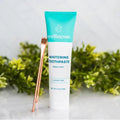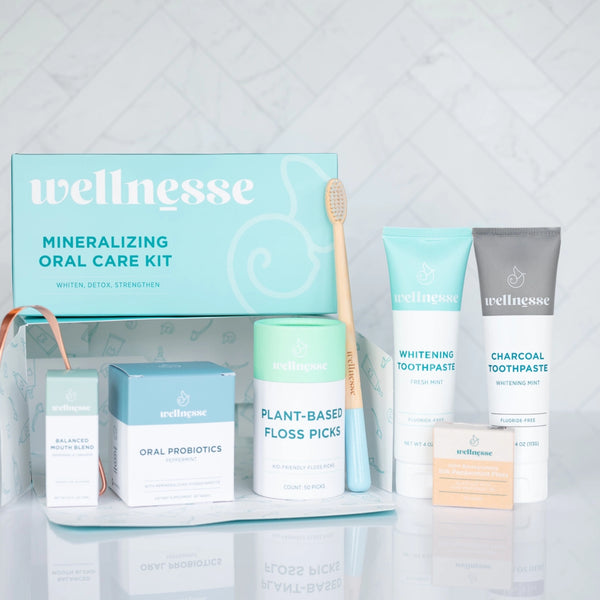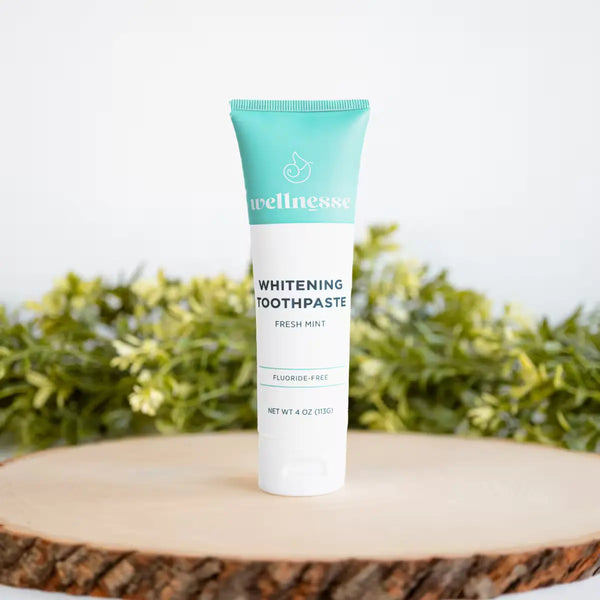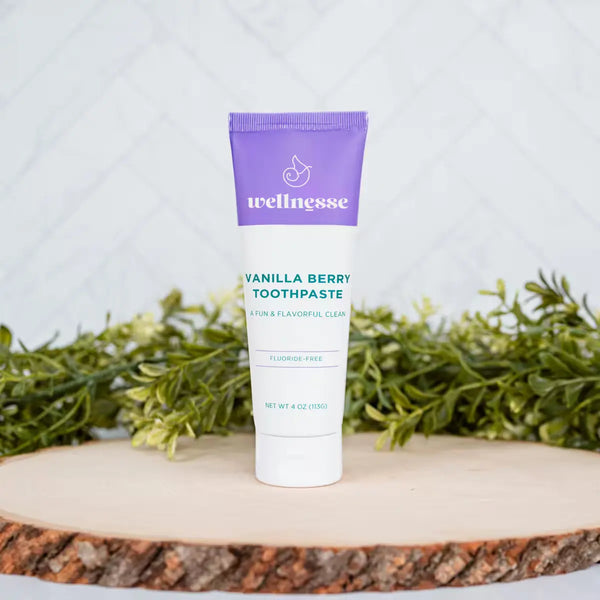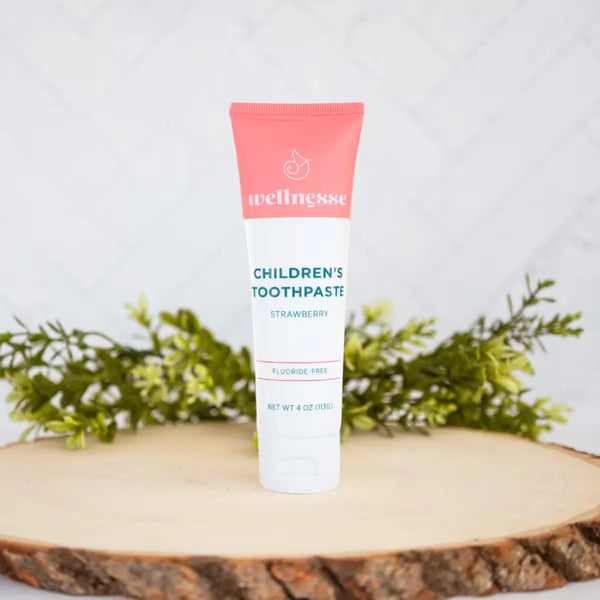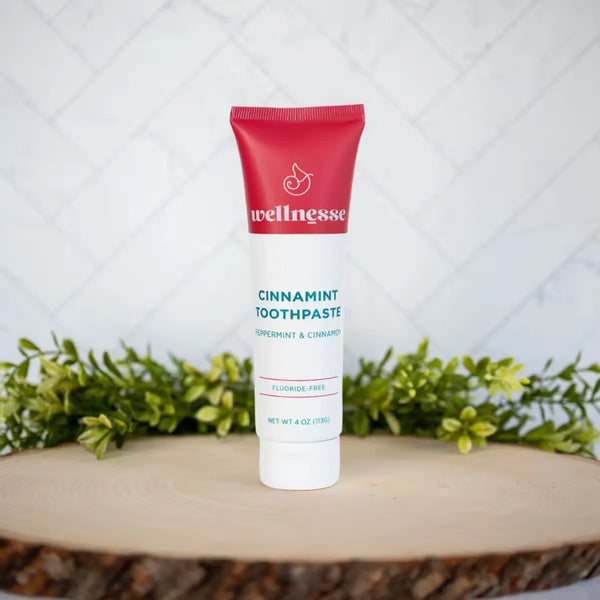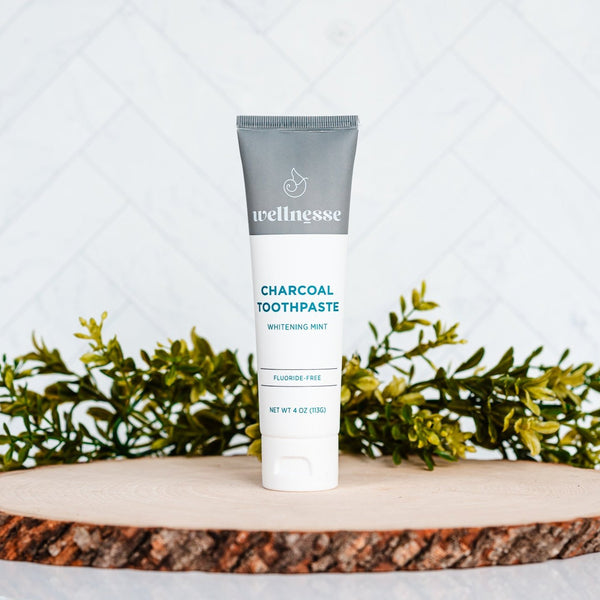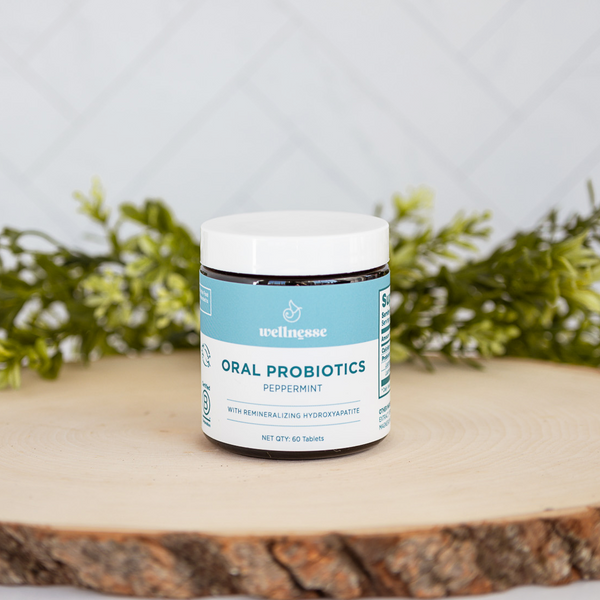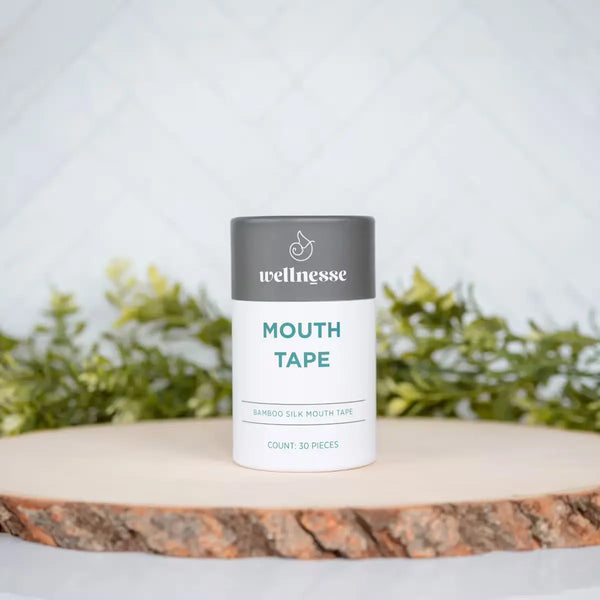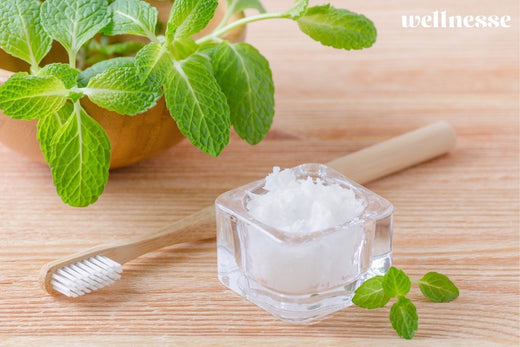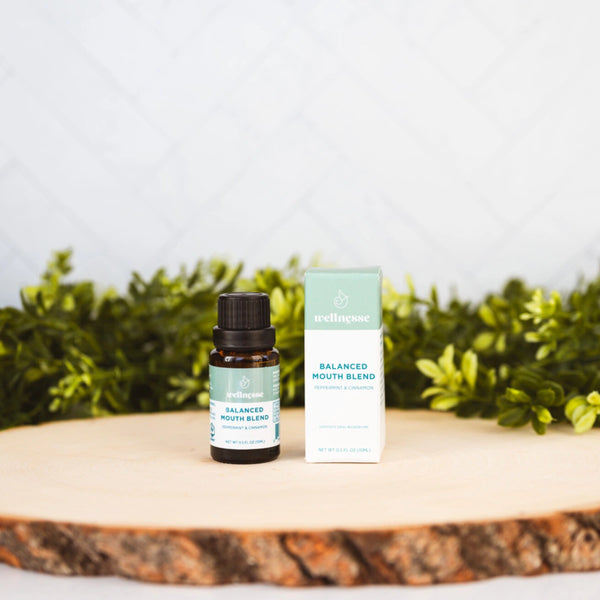Xylitol is a naturally occurring alcohol often derived from birch wood. As a cleaner, healthier alternative to sucrose (table sugar), xylitol provides natural sweetness without the potential enamel-damaging effects of sugar. Xylitol has occasionally been controversial, so we're here to talk about what it is and why we're confident using it in our oral care products!
Upgrade your smile with our best-selling fluoride-free Whitening Toothpaste!
What is the Oral Microbiome?

The oral microbiome is the ecosystem of oral bacteria, fungi, and other microorganisms crucial to strong oral health. This delicate ecosystem balances our bodies with the world, keeping us healthy. Continued research proves more and more the undeniable connection between the mouth and the body as well as between oral health and systemic diseases.
An imbalance in the oral microbiome can cause chronic bad breath, tooth decay, and weakening of gum tissue. Left untreated, it can further lead to an overgrowth of bacteria, resulting in infection.
Xylitol helps balance the oral microbiome, aiding oral hygiene and preventing dangerous bacterial buildup and infections. So, let's talk about it!
What is Xylitol?
Xylitol is a polyalcohol, or sugar alcohol (polyol), found in many fruits and vegetables and often extracted from corn and birchwood. It is sweet but contains far fewer calories than sugar and has nearly the opposite effect when interacting with our dental health. It does not spike blood sugar levels the way sugar does and is considered a low-digestible carbohydrate (meaning it takes its time to break down).
As a side note: Xylitol is not an ingredient you want your dog to consume (if you brush your dog's teeth). When humans ingest xylitol or chew xylitol gum, it does not stimulate insulin release. But when a dog consumes xylitol, it causes their bodies to release a dangerous amount of insulin. The sudden spike in insulin can severely lower the dog's blood sugar, meaning even a small amount could be fatal.
Xylitol's Health Benefits
In the wrong form or excessive amounts (unless the high dosage is intentional), xylitol can also be a laxative in humans. Under certain conditions, xylitol can effectively loosen stool and reduce bloating. Xylitol may also be connected to increased collagen synthesis, which would help bolster bone density and skin strength.
It's also important to remember that xylitol kills bacteria and, as a sweetener, breaks down differently than sugar (which is a good thing!) The substance travels deep into our bodies before it is fully processed, which can mean a few things for the bacteria in our bodies.
In some instances, one-time consumption of xylitol has affected the amount of Gram-positive and Gram-negative bacteria in the consumer's body. Of the two types of bacteria, Gram-negative is considered more dangerous and difficult to kill; along with other serious conditions, Gram-negative is one of the primary types of bacteria responsible for sepsis. Studies suggest that post xylitol consumption, Gram-positive bacteria are detected at higher body rates than Gram-negative bacteria.
Xylitol can also keep the body healthy in cases of overgrown candida. Excess candida leads to a host of issues (such as a fungal invasion of the bones, heart, brain, and blood). Xylitol can help kill the excess yeast, preventing it from harming the body. It is the reason xylitol frequently pops up in anti-candida recipes. Xylitol also cuts down on the bacteria overgrowth in biofilms in the oral cavity, helping to combat gum disease.
Xylitol targets s. mutans (streptococcus mutans), a bacterial strain that can cause tooth decay. This strain takes xylitol into the cell to metabolize it into a phosphate. However, the metabolization process makes xylitol toxic to the bacterium, killing it. Amazingly, studies using xylitol and sorbitol chewing gum show that xylitol does not seem to affect the good bacteria we want to keep in our guts.
How Xylitol Effects our Teeth
The most researched benefits of xylitol are related to dental hygiene.
Plaque bacteria cannot metabolize xylitol, making it an effective agent against harmful buildup and other oral bacteria. Sugar and other sugar alcohols contribute to a less alkaline environment in the mouth, allowing acidic conditions to increase and bad bacteria (like plaque) to grow. In this environment, issues like tooth decay and demineralization will occur more often, replacing healthy teeth with cavity-riddled ones.
Xylitol, on the other hand, does not undergo fermentation. It decreases these acidic conditions and does not feed the harmful bacteria growing in them. Instead, it eliminates those bacteria and reduces their incidence. It also helps wash out harmful bacteria by stimulating salivary flow.
How Saliva Helps the Mouth
This may come as a surprise, but healthy saliva can reduce the risk of dental caries (cavities). As saliva is stimulated, it becomes a natural mouthwash, eliminating bacteria and other havoc-wreaking organisms. It comes with a few more positive effects as well, including remineralization.
Healthy saliva can flood acids and neutralize them. At the same time, it protects the teeth by adding a barrier filled with minerals our bodies can harness to remineralize the teeth.
Since xylitol stimulates saliva production, it's an excellent tool for clearing out plaque and strengthening teeth. When paired with other ingredients, such as hydroxyapatite (a remineralizing agent we use in our bestselling toothpaste), xylitol's effects are greatly enhanced.
While other substances can increase saliva production, they don't offer the same reduced risk for dental cavities or effectiveness against harmful bacteria in the mouth. Although it has been somewhat controversial as a sweetener, xylitol is a beneficial dental hygiene tool worth using to help strengthen tooth enamel and aid our immune systems.
The Source Matters
Most xylitol comes from genetically modified corn, which does not meet our stringent sourcing standards. At Wellnesse, we only use the cleanest, most natural ingredients, which is why the xylitol in our Whitening Toothpaste is sourced from birchwood. It synergistically works with other ingredients (like hydroxyapatite and green tea) to eliminate harmful bacteria, increase saliva production, and strengthen teeth.
Xylitol and the other ingredients in our toothpaste directly impact our oral health, keeping our microbiome balanced and healthy.
With every brush, you strengthen your teeth and the ecosystem protecting them.
Our Top Xylitol Toothpastes
At Wellnesse, we believe in using the right amount of good things. Our toothpaste contains only 5% of non-fermentable Xylitol. This means the bacteria in your mouth can't convert it into harmful acid that causes cavities.
Whitening Toothpaste

Ditch the fluoride and embrace a brighter smile with our hydroxyapatite toothpaste! This dentist-approved formula uses the natural power of hydroxyapatite, which mimics the mineral that makes up your teeth. It doesn't just clean and freshen breath, it actively remineralizes enamel, corrects cavities, and removes stains – all without harsh chemicals. Soothe your gums and enjoy a healthy, confident smile with this natural, effective alternative.
Charcoal Toothpaste

Unveiling the dark side of clean! Our best-selling hydroxyapatite toothpaste gets a powerful upgrade with activated charcoal. This dynamic duo combines the remineralizing strength of hydroxyapatite with charcoal's natural ability to absorb and remove surface stains for a noticeably brighter smile. Enjoy an intensified whitening effect while the charcoal works its detoxifying magic, leaving your mouth feeling fresh and healthy. All with the same gentle, fluoride-free formula and natural ingredients you trust. Experience a whole new level of clean with our charcoal-powered hydroxyapatite toothpaste!
Strawberry Toothpaste
Brushing battles are a thing of the past with our fun and fruity Strawberry Toothpaste! This yummy paste keeps kids coming back for more with its delicious natural strawberry flavor. But it's not just about taste – our fluoride-free formula uses cavity-fighting hydroxyapatite to keep little smiles healthy and strong. We use only safe, gentle ingredients to clean teeth, remove stains, and freshen breath, all without any harsh chemicals that might irritate your child's mouth. Make brushing time a breeze with our yummy Strawberry Toothpaste!
Resources
Salminen S, Salminen E, Koivistoinen P, Bridges J, Marks V. Gut microflora interactions with xylitol in the mouse, rat, and man. Food Chem Toxicol. 1985 Nov;23(11):985-90. DOI: 10.1016/0278-6915(85)90248-0. PMID: 4076932.
Bahador, A., Lesan, S., & Kashi, N. (2012). Effect of xylitol on cariogenic and beneficial oral streptococci: a randomized, double-blind crossover trial. Iranian Journal of Microbiology, 4(2), 75–81.
Söderling E. (2009). Controversies around Xylitol. European journal of dentistry, 3(2), 81–82.
Alexandraki, I., & Palacio, C. (2010). Gram-negative versus Gram-positive bacteremia: what is more alarmin(g)?. Critical care (London, England), 14(3), 161. https://doi.org/10.1186/cc9013
Mäkinen KK. Sugar alcohol sweeteners as alternatives to sugar with special consideration of xylitol. Med Princ Pract. 2011;20(4):303-20. DOI: 10.1159/000324534. Epub 2011 May 11. PMID: 21576989.
Mattila PT, Pelkonen P, Knuuttila ML. Effects of a long-term dietary xylitol supplementation on collagen content and fluorescence of the skin in aged rats. Gerontology. 2005 May-Jun;51(3):166-9. DOI: 10.1159/000083988. PMID: 15832042.
VCA Animal Hospitals: Xylitol Safety in Dogs
Wells, K. (2020, May 22). Xylitol: Is it Healthy or Safe?: Wellness Mama. Retrieved December 20, 2020, from https://wellnessmama.com/12614/xylitol-healthy/
